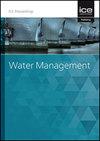Deriving reservoir operating rules considering ecological demands of multiple stations
IF 1.1
4区 工程技术
Q3 ENGINEERING, CIVIL
Proceedings of the Institution of Civil Engineers-Water Management
Pub Date : 2021-12-17
DOI:10.1680/jwama.21.00009
引用次数: 2
Abstract
Reservoirs play important roles in hydropower generation, flood control, water supply, and navigation. However, the regulation of reservoirs is challenged due to their adverse influences on river ecosystems. This study uses ecoflow as an ecological indicator for reservoir operation to indicate the extent of natural flow alteration. Three reservoir optimization models are established to derive ecological operating rule curves. Model 1 only considers the maximization of average annual hydropower generation and the assurance rate of hydropower generation. Model 2 incorporates ecological objectives and constraints. Model 3 not only considers the hydropower objectives but also simulates the runoff and calculates the ecological indicator values of multiple downstream stations. The three models are optimized by a simulation-optimization framework. The reservoir ecological operating rule curves are derived for the case study of China's Three Gorges Reservoir. The results represent feasible schemes for reservoir operation by considering both hydropower and ecological demands. The average annual power generation and assurance rate of a preferred optimized scheme for Model 3 are increased by 1.06% and 2.50%, respectively. Furthermore, ecological benefits of the three hydrologic stations are also improved. In summary, the ecological indicator ecoflow and optimization models could be helpful for reservoir ecological operations.推导了考虑多站生态需求的水库运行规律
水库在水电、防洪、供水、通航等方面发挥着重要作用。然而,由于水库对河流生态系统的不利影响,水库的调控受到了挑战。本研究将生态流量作为水库运行的生态指标,以反映自然流量变化的程度。建立了3种油藏优化模型,导出了生态运行规律曲线。模型1只考虑年平均水力发电量最大化和水力发电保证率。模型2包含了生态目标和约束。模型3既考虑水电目标,又模拟径流,计算下游多个站的生态指标值。采用仿真优化框架对三种模型进行了优化。以三峡水库为例,导出了水库生态运行规律曲线。研究结果为综合考虑水电和生态需求的水库调度提供了可行的方案。优选方案使Model 3的年平均发电量和保证率分别提高1.06%和2.50%。此外,三个水文站的生态效益也有所提高。综上所述,生态指标、生态流量和优化模型对水库生态作业有一定的指导作用。
本文章由计算机程序翻译,如有差异,请以英文原文为准。
求助全文
约1分钟内获得全文
求助全文
来源期刊
CiteScore
2.10
自引率
0.00%
发文量
28
审稿时长
6-12 weeks
期刊介绍:
Water Management publishes papers on all aspects of water treatment, water supply, river, wetland and catchment management, inland waterways and urban regeneration.
Topics covered: applied fluid dynamics and water (including supply, treatment and sewerage) and river engineering; together with the increasingly important fields of wetland and catchment management, groundwater and contaminated land, waterfront development and urban regeneration. The scope also covers hydroinformatics tools, risk and uncertainty methods, as well as environmental, social and economic issues relating to sustainable development.

 求助内容:
求助内容: 应助结果提醒方式:
应助结果提醒方式:


